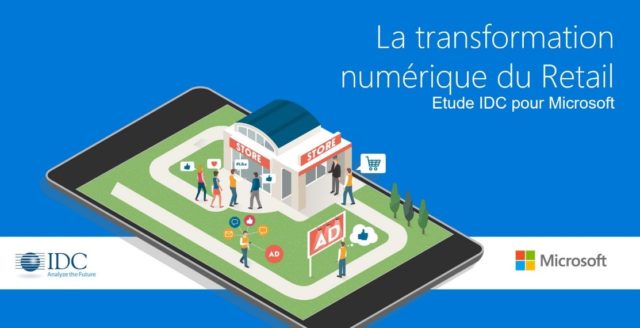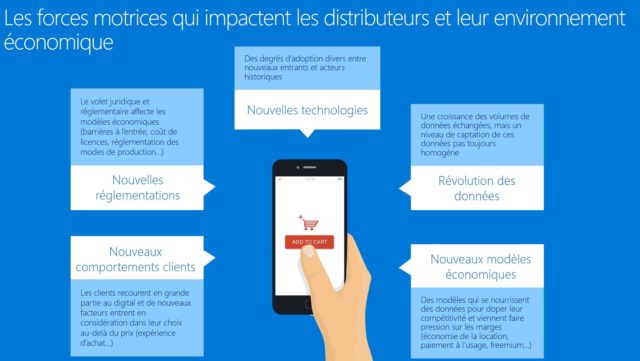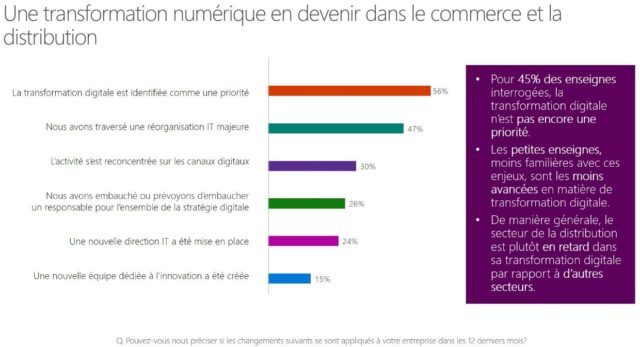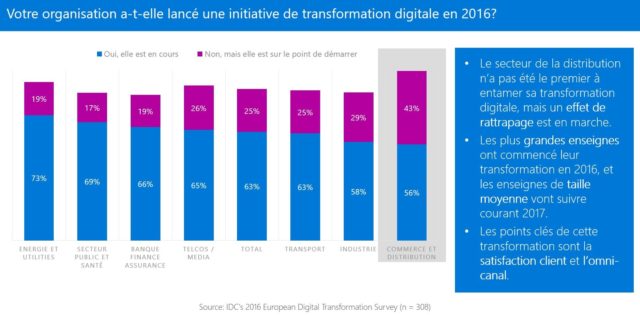A study on the digital transformation of the retail sector was conducted by IDC for Microsoft with 117 brands: food, jewellery/optics, DIY/garden, cosmetics/pharmacy, culture/multimedia, household equipment, services/telephony, sport , clothes shoes,…
Through this study, various questions have been addressed with regard to the digital transformation of Retail. What transformations does the distribution sector have to face?
First, the driving forces that impact distributors and their environment were addressed. In total, 5 key elements are part of the digital revolution in retail:
- New technologies : there are varying degrees of adoption between new entrants and incumbents
- The data revolution: there is an increase in the volumes of data exchanged, but a level of capture of this data is not always uniform.
- New business models: these models feed on data to boost their competitiveness and put pressure on margins (freemium, pay-per-use, rental economy, etc.).
- New customer behaviors: customers largely resort to digital and new factors come into consideration in their choice beyond price (purchasing experience).
- New regulations: the legal and regulatory aspect affects economic models (barriers to entry, cost of licenses, regulation of production methods, etc.).
4 major trade and distribution initiatives in France
The study carried out highlights 4 essential elements in the optimization of distribution in France.
# 1: Customer experience and hyper personalization. The first initiative concerns improving customer services and the experience across all channels (online and in-store). According to the Microsoft study, the priority for this initiative is very high (4 out of 5).
# 2: Operational excellence. The second major initiative concerns the optimization of flows from the order to the delivery of the product. According to the Microsoft study, the priority for this initiative is high (3,5 out of 5).
# 3: The reduction of blows. The third major initiative is related to cost reduction. Controlling costs is particularly important in an industry where margin pressure is high. According to the Microsoft study, the priority for this initiative is high (3,4 out of 5).
# 4: The development of the capacities of the collaborators. The idea is to enhance the activity of employees by developing technologies at the point of sale. According to the Microsoft study, the priority for this initiative is high (3 out of 5).
Digital transformation in the distribution sector
It seems that the digital transformation of retailers is not yet the top priority. Indeed, for 45% of the brands questioned, this is not the priority. More specifically, it is the small retailers that are the least advanced in terms of digital transformation. Moreover, the distribution sector is particularly behind in its digital transformation compared to other sectors.
In the Microsoft study, few concrete actions related to digital transformation have been implemented:
- Only 15% of companies surveyed have created a team dedicated to innovation.
- 24% of companies have set up a new IT department.
- 26% of brands have hired or plan to hire a manager for the entire digital strategy.
- Only 1/3 of companies have refocused their activity on digital channels.
Digital transformation initiatives in 2016
The distribution sector was not the first to begin its digital transformation, but there is a real catch-up effect. Indeed, the largest retailers began their transformation in 2016 while the medium-sized retailers followed in 2017. It seems that the key points of the transformation are customer satisfaction and omnichannel.
Who decides on the digital transformation in business?
Digital transformation in business is more a matter of management for 56% of the brands surveyed. In the end, the IT department is not as involved as one might think.
The digital transformation of companies in 2017 / 2018 will go through business investments:
- Average growth rate of IT expenditure expected over the period 2015-2020: +2,8% per year.
- 48% of the business departments surveyed plan to increase the budget they devote to IT, and only 4% plan to reduce it.
- Cost reduction is the main objective of IT departments, at the same level as improving service to the end user.
The cloud, at the center of attention…
Of the retailers that use the Cloud, half use it as a priority or exclusively. Another 58% of companies surveyed favor traditional IT when it comes to software solutions. The distribution sector is the one that still uses the least of the capabilities of the cloud.
As far as data is concerned, faced with the increase in data, the main initiative has been to invest in new storage technologies. However, more than 66% distributors are now considering increasing the use of big data to take advantage of this data. The use of big data mainly seems to be an issue in order to improve the customer experience (67%), to improve operational efficiency (56%) and business innovation (17%).
Currently, around data, distribution companies are focused on agile management of prices and promotions (39%) and platforms for managing data from multiple sources for marketing (Data Management Platform) (28% ).
And you, what are your plans for the digital transformation of your company? Where do you start? What are your difficulties?




